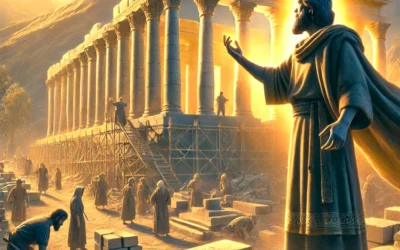The Book of Ecclesiastes is the twenty-first book of the Bible and part of the wisdom literature.
Traditionally attributed to King Solomon, this book explores deep questions about the meaning of life, the limits of human understanding, and the futility of worldly pursuits.
It is both philosophical and poetic, often repeating the phrase: “Vanity of vanities, all is vanity.”
Despite its tone of cynical reflection, Ecclesiastes ultimately points us to the only source of true purpose: fearing God and keeping His commandments.
Life “Under the Sun” Is Meaningless Without God (Ecclesiastes 1–2)
The author, referred to as “the Teacher” or “Qoheleth,” opens with the bold declaration that everything is meaningless without an eternal perspective.
Key Highlights:
- Human accomplishments, wisdom, pleasure, and wealth all fail to satisfy.
- The Teacher tries everything the world has to offer but finds it empty.
- He concludes that life under the sun (apart from God) is ultimately vain.
Lesson: Earthly pursuits cannot fill the void in our hearts—only God can.
A Time for Everything (Ecclesiastes 3)
One of the most famous chapters in the Bible, this section declares that life has seasons—both joyful and sorrowful—and that God has a purpose in all of them.
Key Highlights:
- “There is a time for everything and a season for every activity under the heavens…” (Ecclesiastes 3:1)
- God has “set eternity in the human heart,” yet we cannot fully understand His work.
Lesson: God is in control of time, and everything has its place—even if we don’t understand it yet.
The Futility of Wealth, Power, and Injustice (Ecclesiastes 4–6)
The Teacher reflects on the inequities of life, including oppression, loneliness, envy, and the never-ending desire for more.
Key Highlights:
- “Better one handful with tranquillity than two handfuls with toil and chasing after the wind.” (Ecclesiastes 4:6)
- Wealth does not bring lasting satisfaction or security.
Lesson: Contentment is more valuable than endless striving.
Wisdom and the Fear of God (Ecclesiastes 7–11)
Though life is full of mystery and injustice, the Teacher urges us to live wisely, enjoy life humbly, and fear God.
Key Highlights:
- “Do not be overrighteous… the one who fears God will avoid all extremes.” (Ecclesiastes 7:16–18)
- Enjoy your work, your food, your spouse—but remember that God is the giver of all good things.
- “Remember your Creator in the days of your youth…” (Ecclesiastes 12:1)
Lesson: Live with reverence, humility, and gratitude—especially while you still have time.
The Conclusion of the Matter (Ecclesiastes 12)
After all the reflections and reasoning, Ecclesiastes ends with a powerful conclusion: Fear God and keep His commandments, for this is the whole duty of mankind.
Key Highlights:
- Everything will be judged—both hidden and revealed.
- God’s justice is certain, even if life seems unfair in the present.
Lesson: The only lasting meaning in life comes from living in the right relationship with God.
Final Thoughts
The Book of Ecclesiastes is a sobering yet hope-filled reflection on life’s big questions.
It reminds us that success, wisdom, and pleasure are empty without God, but a life anchored in reverence for Him is full of purpose, joy, and eternal value.





